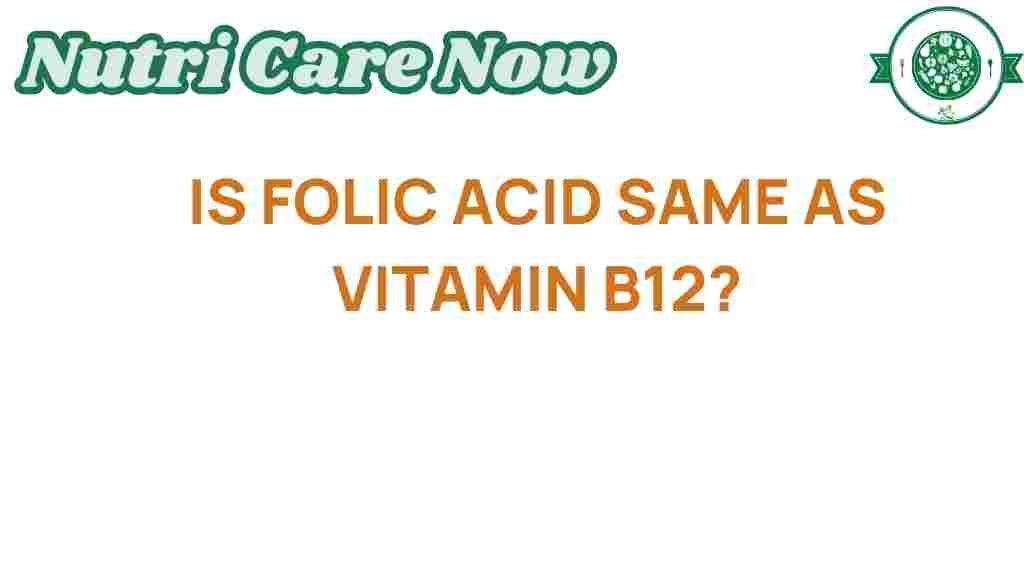Is Folic Acid the Same as Vitamin B12? Unraveling the Truth
When it comes to nutrition, vitamins play a crucial role in maintaining our health and well-being. Among these essential nutrients, folic acid and vitamin B12 often come up in discussions about dietary supplements and their health benefits. However, many people are left wondering: Are folic acid and vitamin B12 the same? In this article, we will explore the differences and similarities between these two vital vitamins, their food sources, and their importance for overall wellness.
Understanding Folic Acid and Vitamin B12
Both folic acid and vitamin B12 are part of the B-vitamin family, but they serve different functions in the body. Here’s a closer look at each nutrient:
What is Folic Acid?
Folic acid, also known as vitamin B9, is a water-soluble vitamin that is crucial for DNA synthesis, cell division, and growth. It is especially important for pregnant women as it helps prevent neural tube defects in developing fetuses.
What is Vitamin B12?
Vitamin B12, or cobalamin, is another vital water-soluble vitamin that plays a significant role in red blood cell formation, neurological function, and DNA synthesis. It is primarily found in animal products, making it essential for those on a vegetarian or vegan diet to consider supplementation.
Key Differences Between Folic Acid and Vitamin B12
While both folic acid and vitamin B12 are B-vitamins, they have distinct functions and sources:
- Source: Folic acid is commonly found in leafy greens, beans, and fortified grains, whereas vitamin B12 is mainly found in animal products like meat, fish, eggs, and dairy.
- Function: Folic acid is crucial for cell growth and metabolism, while vitamin B12 is essential for nerve health and the production of red blood cells.
- Deficiency Symptoms: A deficiency in folic acid can lead to anemia and neural tube defects, while a vitamin B12 deficiency can cause neurological issues and pernicious anemia.
The Health Benefits of Folic Acid and Vitamin B12
Both vitamins provide significant health benefits:
Health Benefits of Folic Acid
- Supports DNA Synthesis: Folic acid is vital for the production and repair of DNA.
- Prevents Anemia: It helps in the formation of red blood cells and prevents anemia.
- Promotes Healthy Growth: Essential during pregnancy for fetal development.
Health Benefits of Vitamin B12
- Boosts Energy Levels: Helps in the formation of red blood cells, which carry oxygen throughout the body.
- Supports Brain Health: Vital for maintaining healthy nerve cells and brain function.
- Reduces Risk of Heart Disease: Helps lower homocysteine levels, which are linked to heart issues.
Common Food Sources
To effectively incorporate folic acid and vitamin B12 into your diet, consider the following food sources:
Food Sources of Folic Acid
- Leafy green vegetables (spinach, kale)
- Legumes (lentils, beans)
- Fortified cereals and grains
- Asparagus and Brussels sprouts
- Oranges and bananas
Food Sources of Vitamin B12
- Meat (beef, poultry)
- Fish (salmon, trout)
- Dairy products (milk, cheese)
- Eggs
- Fortified nutritional yeast (for vegans)
Who Might Need Supplements?
While a balanced diet is the best source of these vitamins, some individuals may require dietary supplements:
- Pregnant Women: To prevent neural tube defects.
- Vegans and Vegetarians: As they may not get enough vitamin B12 from diet alone.
- Older Adults: They may have decreased absorption of vitamin B12.
- Individuals with Certain Health Conditions: Such as celiac disease or Crohn’s disease, may need supplements.
Deficiency Symptoms and Risks
Understanding the symptoms of deficiencies can help you identify potential health issues:
Symptoms of Folic Acid Deficiency
- Fatigue and weakness
- Irritability
- Shortness of breath
- Pale skin
Symptoms of Vitamin B12 Deficiency
- Fatigue and weakness
- Nerve problems like numbness or tingling
- Balance issues
- Memory loss
Troubleshooting Tips for Vitamin Deficiencies
If you suspect a deficiency in folic acid or vitamin B12, here are some troubleshooting tips:
- Consult a Healthcare Professional: They can test your vitamin levels and recommend appropriate supplements.
- Evaluate Your Diet: Ensure you are consuming a balanced diet rich in fruits, vegetables, whole grains, and animal products (if not vegetarian/vegan).
- Consider Fortified Foods: Look for cereals, breads, and plant-based milks fortified with B vitamins.
Conclusion
In summary, while folic acid and vitamin B12 are both essential B-vitamins that contribute to overall health and wellness, they are not the same. They have distinct functions, sources, and implications for health when deficiencies occur. Incorporating a variety of foods high in these vitamins can help ensure you meet your nutritional needs. If you have concerns about your vitamin intake or are considering dietary supplements, it’s always best to consult a healthcare professional.
For more information on maintaining a balanced diet and understanding the role of vitamins in health, you may find this resource helpful: Nutrition and Wellness Guidelines.
By understanding the differences and importance of folic acid and vitamin B12, you can make informed choices that support your health and well-being.
This article is in the category Health and created by NutriCareNow Team
